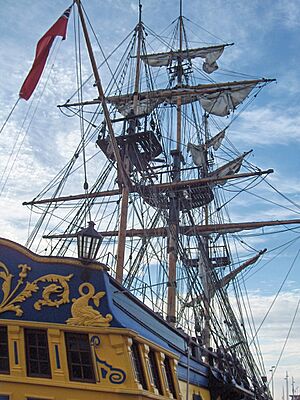Mast facts for kids
A mast on a sailing ship is a tall, strong pole that stands straight up. Its main job is to hold up the sails, which catch the wind and make the ship move. Bigger ships often have several masts, and their size and number depend on the ship's design.
Contents
How Masts Were Built
For a very long time, until the 20th century, ship masts were made from wood. They were usually built from a single, very straight tree trunk. As ships grew larger and needed taller masts, it became hard to find single trees that were big enough.
Building Taller Masts
To make taller masts for bigger ships, builders started joining several wooden poles, called spars, together. They would tie these spars tightly with ropes or metal bands. This way, they could create a much taller and stronger mast than any single tree could provide.
Parts of a Mast
A mast is not just one simple pole. It is made of different sections that fit together.
- Lower Mast: This is the lowest part of the mast. It is the strongest section and is fixed firmly to the ship's deck.
- Topmast: This section sits above the lower mast. It is usually lighter and helps extend the mast's height.
- Topgallant Mast: On very tall ships, another section called the topgallant mast sits above the topmast. This makes the mast even taller.
Mast Support and Rigging
Masts need a lot of support to stay upright, especially when strong winds push against the sails.
- Stays: These are strong ropes or cables that run from the mast down to the front (bow) or back (stern) of the ship. They pull the mast forward or backward.
- Shrouds: These are ropes or cables that run from the mast down to the sides of the ship. They pull the mast sideways and keep it from swaying.
- Ratlines: These are small ropes tied horizontally across the shrouds. They form a ladder that sailors use to climb up the mast to work with the sails.
Different Types of Masts
The number and names of masts on a ship depend on its size and design.
- Schooner: This type of ship usually has two or more masts. The front mast is often shorter than the back mast.
- Brig: A brig has two masts, both of which carry square sails.
- Clipper: Famous for their speed, clipper ships could have three or more very tall masts, all designed to carry a lot of sail.
Modern Masts
Today, most large ships use engines instead of sails. However, some modern sailing ships and yachts still use masts. These masts are often made from strong, lightweight materials like aluminum or carbon fiber. They are designed to be very efficient and easy to control with modern technology.
 | Jackie Robinson |
 | Jack Johnson |
 | Althea Gibson |
 | Arthur Ashe |
 | Muhammad Ali |



